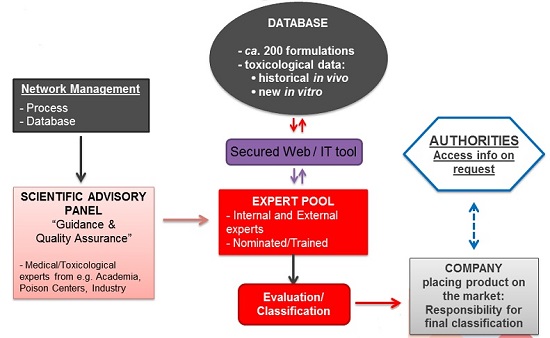An overview of the DetNet structure is illustrated below:

-
DetNet database
The cornerstone of DetNet is a database consisting of ca. 200 Reference Formulations.
-
Expert pool
This is the group of ‘classification experts’ (those that have been nominated by member companies, that meet the eligibility criteria and have followed the online training), i.e. individuals that will have access to the DetNet database and be able to derive classification on that basis. All experts need to sign a non-disclosure agreement.
The expert pool also includes ‘External Experts’ (proposed by A.I.S.E.) who are available for companies to use as needed in case the company does not have classification expertise in-house or a company expert needs a second opinion on a classification. If a company wants to use the services of an external expert, additional costs will apply. The actual final cost would depend on the contractual arrangements between the company requesting the service and the external expert.
-
Scientific Advisory Panel
The Scientific Advisory Panel (SAP) comprises recognised independent experts in the fields of toxicology, dermatology or ophthalmology who have been working with A.I.S.E. to ensure that DetNet is a robust and relevant means of correctly classify detergent and cleaning products.
SAP members act and decide independently and solely on the basis of scientific considerations, under full confidentiality.
The role of the SAP under DetNet is to provide advice to A.I.S.E. on the scientific approach, toxicological assessment, clinical experience and generation of reliable data (for classification purposes).
The list containing the names of SAP members is available here.
-
Access to authorities
Making classification data available to authorities, on request, is a legal requirement from CLP. At company level, classification records (including classification principles applied) should be kept for 10 years and made available to enforcement authorities in case of inspection. Further, A.I.S.E. will make available detailed mixture information to inspectors on request, namely the full composition of the Reference Formulation(s) used to derive classification and/or the corresponding full test reports.